The Rhode Island ACLU today filed a federal lawsuit against the Town of West Warwick, challenging its discriminatory enforcement of an ordinance that significantly limits the posting of political signs in the town. The suit was filed by ACLU volunteer attorney Richard A. Sinapi on behalf of town resident Thomas K. Jones, who is both a state legislative candidate and an outspoken critic of plans to develop a water park in the town. The suit argues not only that the ordinance violates Jones’ freedom of speech, but also that it has been enforced against him by town officials in a discriminatory manner. Although signs that he has displayed have been cited for violating the ordinance, dozens of other political signs supporting other candidates have not been cited at all.
In August, Jones and his supporters began displaying political signs on their property, some promoting his candidacy and others criticizing the proposed construction of the water park. A day before the September primary election, Acting Building Official Frank Venezia hand-delivered notices to Jones and the homeowners advising them that the signs – which were 32 square feet – were too large and violated the Town’s zoning ordinance. They were told to remove the signs within 24 hours or else face financial penalties. The RI ACLU immediately wrote a letter to Venezia, arguing that the ordinance was clearly unconstitutional. The building official’s response was to send out another warning notice to violators. Rather than risk any fines, Jones had all the signs removed.
The lawsuit makes a number of legal claims. In addition to arguing that the ordinance is unconstitutionally vague – one provision limits political signs to eight square feet and another specifies four square feet – the suit alleges that the ordinance also appears to completely ban the “water park” signs, since only signs that directly support or oppose a candidate or ballot question are explicitly allowed. In light of the vagueness of the law, the ACLU suit claims, residents are unconstitutionally deterred from engaging in political speech.
The ACLU lawsuit further notes that the ordinance allows various types of non-political signs to be much larger than eight square feet, and calls this discriminatory treatment of political signs a clear violation of the First Amendment. Finally, the suit alleges that the ordinance is being selectively enforced, as Jones provided evidence of dozens of similarly-sized political signs supporting other candidates being allowed to remain displayed throughout the Town.
The suit seeks a temporary restraining order against enforcement of the ordinance, as well as an award of damages and attorneys’ fees. A copy of the ACLU’s complaint and memorandum of law are available on its website at www.riaclu.org.


